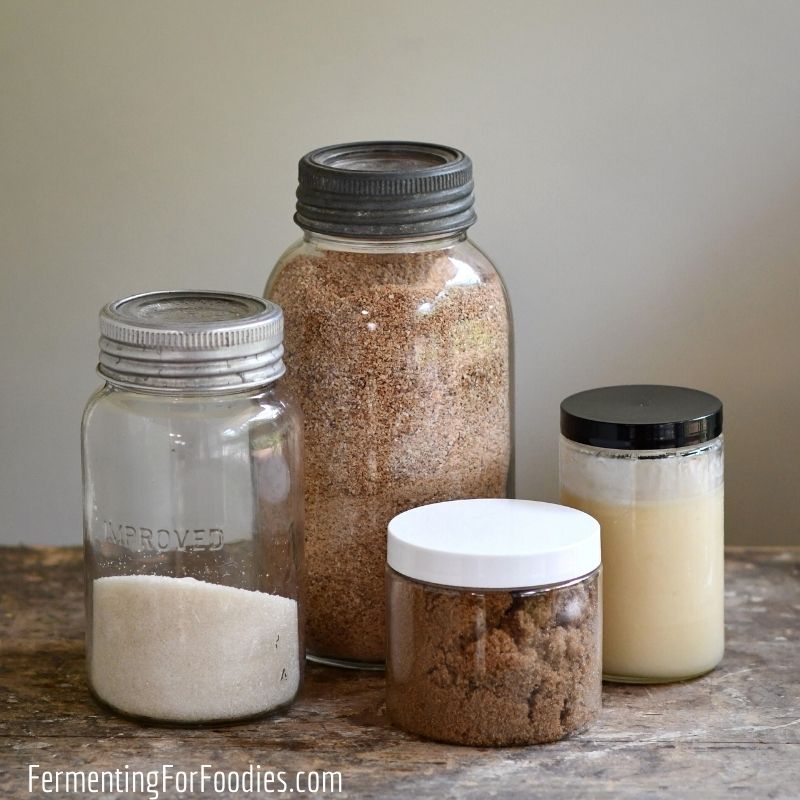Are you confused about which types of sweeteners are healthy? Which ones are the best for diet and weight-loss? Here is everything you need to know about sugar and alternative sweeteners.

Sugar. It’s the sweetness in our celebrations and the scourge of society. It’s hard to know how to strike a balance that is healthy and delicious. Here’s everything you need to know about sugar and other types of sweeteners so that you can make the BEST choice for your health and wellness.
Why Sugar matters
Understanding the composition of sugar and other types of sweeteners is important for a number of reasons.
- Weight Loss Diets: Most weight-loss diets involve carb restrictions, in particular white sugar and other high-calorie sweeteners.
- Food Intolerances: There are a number of sugar-related food intolerances, due to low or absent digestive enzymes. Lactose intolerance and CSID (sucrose and isomaltase intolerance) are two such examples.
- Glycemic Index: Glycemic index (GI) is the rise in blood sugar levels two hours after eating. GI is affected by a meal’s sugar, fat, and protein content. GI is important for losing weight and controlling diabetes or hyperglycemia.
- Fermentation: Most fermentation involves the breakdown of carbohydrates. Using the right type of sugar to feed a particular probiotic culture is important.
- Gut Health: Your microbiome is made up of all the tiny microorganisms that live in and on your body. Sugar and other types of sweeteners affect the composition of your microbiome. However, it works both ways, since the types of organisms in your gut affect your sugar cravings.
Types of Sugars
Here’s an overview of the different types of sugar. It focuses on how our bodies process each of these types of sugar, and the common varieties. If you’re mostly concerned about choosing the best sweeteners for weight loss, head down to the next section.
Glucose
Glucose is the type of sugar that our body uses for energy. When we eat glucose-containing foods we get a “sugar high.” Our blood sugar levels increase until insulin is released by the body to move the glucose from the bloodstream to our cells.
The glycemic index measures how quickly carbohydrates are broken down into glucose. For example, simple carbs like white bread and white rice will break down more quickly than complex whole grains.
Here are two examples of high glucose sweeteners:
- Corn syrup
- Brown rice syrup
Fructose
Fructose is a sugar that is naturally found in fruits and vegetables. Unlike glucose, it doesn’t go right into the bloodstream. Instead, it is converted by the liver into storage energy (aka fat). Vegetables and fruits don’t contain enough fructose to cause a problem and the absorption is balanced by the fiber content.
However, if you are concerned about weight loss, you may want to avoid high-fructose sweeteners:
- High fructose corn syrup
- Agave nectar
- Fruit juice concentrate
Sucrose
Sucrose is a 50/50 mix of glucose and fructose. It is what most people think of when they think of sugar. It includes:
- White sugar, powdered sugar, caster sugar
- Brown sugar, molasses, turbinado sugar, demerara sugar
- Coconut sugar, sugar cane, or sugar beets
- Maple syrup
Honey and dates are also around a 50/50 mix of glucose and fructose, however, the glucose and fructose are not in the form of sucrose.
Sucrose is broken down to glucose and fructose during digestion. So it has the properties of both glucose (entering the blood stream right away, causing a glycemic spike) and fructose (converted into storage energy by the liver).
Sugar Alcohols
Sugar alcohols are sweeteners that are not absorbed by the body, however, they are consumed by certain bacteria and yeasts in the gut. Since they enter the intestine undigested, consuming too many sugar alcohols will upset the balance of your gut bacteria, and may cause diarrhea and other digestive problems.
As a proponent of a healthy Microbiome Diet, I do not recommend using sugar alcohols as an alternative sweetener as they aren’t good for gut health.
Here is a list of common sugar alcohols:
- Xylitol
- Sorbitol
- Maltitol
- Erythritol
Other Zero Calorie Sweeteners
There are a number of zero-calorie sweeteners that provide sweetness, while not containing any nutrient sugars. There are both natural and chemical non-nutrient sweeteners.
They seem like the ideal option for anyone with a sweet tooth who is looking to lose weight. However, zero-calorie sweeteners DO NOT HELP WITH WEIGHT LOSS. If the all-cap letters seem a bit extreme, unfortunately, there’s plenty of research linking zero-cal sweeteners to weight gain.
One of the issues is that zero-calorie sweeteners cause us to lose our natural ability to link eating with insulin response and feelings of fullness. So zero-calorie sweeteners may actually contribute to over-eating.
Here is a list of common zero-calorie sweeteners:
- Saccharin
- Aspartame
- Sucralose
- Stevia
- Monkfruit
Sweeteners for Weight-Loss Diets
Many weight-loss diets involve carb and sugar restrictions. Reducing sugar intake is also a great way to balance the yeasts and bacteria in your digestive system to improve the overall health of your microbiome.
While it is tempting to replace sugar with sugar alcohols or zero-calorie sweeteners, these will not help in the long run.
If you have a sweet tooth and want to try reducing your intake of sugar, reach for naturally sweet fruits and vegetables. It is far better to eat a whole strawberry then add stevia to a low-calorie baked good. Even fruits and vegetables that are high in sugars still contain fiber, vitamins, and antioxidants to feed your gut.
Here are some naturally sweet fruits and vegetables that are perfect as a low sugar alternative:
- Sweet potato & yam
- Banana
- Apples
- Pears
- Carrots
If you really need sugar for baking, then I recommend using ground dates. Dates are about 63% glucose/fructose, but it’s balanced with fiber. Mixed into a baked good they won’t provide a high hit of sugar.
Sugar for fermentation
Fermentation often depends on the breakdown of sugars. Usually, the sugar naturally comes from the food that you are fermenting (milk, grains, vegetables). However, there are several fermented beverages that require sucrose (sugar), including:
For any of these ferments, you will need to use a high sucrose sweetener to feed the bacterial and yeast culture. However, the sugar is consumed during the fermentation, so there will be less and less sugar the longer the fermentation takes place.
Any questions/comments about sugar and other sweeteners? Share in the comment section or on our Facebook Group.


Hi Emilie! I am reading up on fermenting foods and have came across several of your articles. I often can vegetables but haven’t got much into fermenting other then some sour Kraut. This may be a silly question but can you only ferment a sour tasting vegetable or can you get a sweet and sour reader with fermentation with using using a sweetener? For instance, sweet and sour pickles or pickles beets? Hope I am making sense! Love your blog!
Hi Shavanna, Great question! Most fermentation involves yeast and bacteria eating sugar, making things taste sour. However, I do have some sweet ferments. These involve added sugar or honey to sweeten the flavour. This can either be done after fermentation (like in my zucchini relish) or as part of the fermentation like in the sweet and sour pickles. Reducing the fermentation time also will make the ferment less sour. Enjoy!
Thanks for your response! I will check those out.. blessings!
Which artificial sweeteners can be use for making Rusk toast having (30-40 percent sugar)in bakery goods.
I have never heard of Rusk toast… however a quick google search suggests it’s a hard biscuit, but generally it doesn’t seem to have that much sugar. (1/4 cup for 2 cups of flour). It probably depends on what the sugar in the rusk toast is for. If it’s mostly for flavour, then you could just not include it, or use your favourite sweetener. I would avoid using artificial sweeteners for rusk toast if you plan on feeding it to children. Hope this helps! Cheers, Emillie
Hi Emilie,
What do you think about allulose? It’s not sugar alcohol, just low-carb sugar.
Hi Olga,
I had to google allulose since it’s a relatively new sugar. In this list of sugars, it would most likely fall under a zero-calorie sweetener. However, it may also be fructose-like as it seems to be closely related to fructose. I notice that new sweeteners always come onto the market as “a miracle alternative”, then as more information comes out about them it’s usually not as good as it seems. Coconut sugar was one of those… it’s not a “healthy alternative to sugar” because it’s mostly sucrose, aka sugar.
I guess it depends on what you want from a sugar alternative? Cheers, Emillie